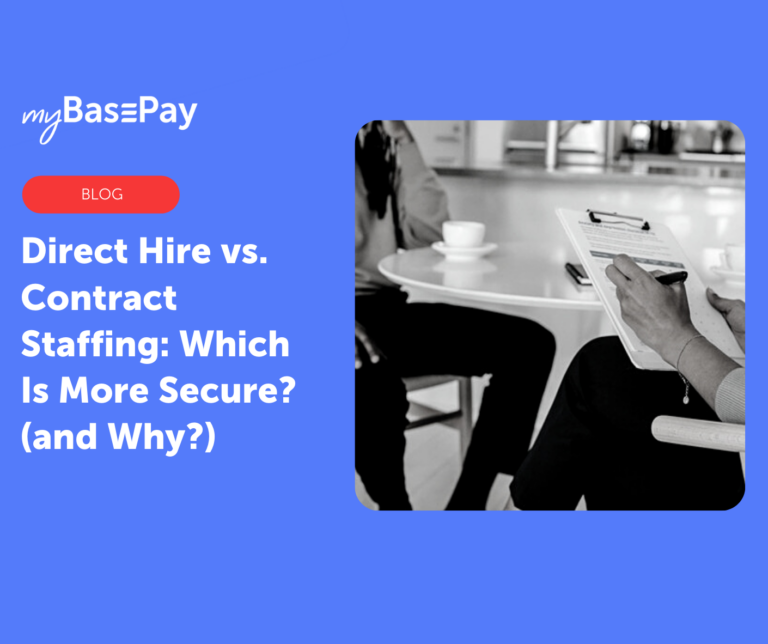Staffing Firms: 6 Tips to Strongly Consider When Outsourcing Payroll
Payroll is a crucial aspect for any company — it’s more than just collecting employee hours, calculating wages, and issuing paychecks. Your payroll administrators must adhere to various local, state, and federal requirements.
Since trusting an external service with such an important part of business operations can be risky, it’s no surprise that most businesses choose to keep this task in-house. But as industries experience transformative shifts, companies are coming to realize that outsourcing payroll offers several benefits, like cost and risk reduction, avoiding paying penalties, gaining access to technology, and increased data security, among others.
When selecting an outsourced payroll provider, it’s vital that you find the best partner based on your business needs and goals. These aspects can vary from company to company, but once you’ve determined what’s most important to your business, you’ll have to consider your options carefully. When done right, outsourcing payroll can be beneficial.
Here are six tips to consider when searching for the best payroll provider:
1. Data Protection
The data included throughout your payroll solution is incredibly sensitive and should receive the utmost level of security. This should be the first major consideration when selecting an outsourced payroll provider.
With the number of ransomware and cyberattacks only becoming more widespread, finding a quality payroll management software that offers the capabilities to safeguard your company’s critical data — like employee’s social security numbers, banking and routing details, tax data, and salary information — will make all the difference.
Before selecting a provider, you should take the time to check their payroll management systems. Talk to your potential providers about what policies and procedures they have in place. This will give you an idea of how effective their data protection capabilities will be for you and your employees.
2. Reputation
Unfortunately, some providers will promise more than they can deliver. You don’t want your company to fall victim to such a case, so you should consider looking into all your potential providers’ reputations.
The best way to determine how effective a provider will be is by analyzing how effective they have been with past clients. As you go through your list of potential vendors, look for reliable references on technology publications or industry news websites. You can also browse through review sites to read up on actual users and their experience with certain providers.
As you learn about each company’s experience, remember that every business is different according to goals, size, location, and budget. What one user might deem a poor provider, another might consider a great service. The key is to look for objective reviews so you can determine realistically the effectiveness of an outsourced payroll provider’s solutions.
3. Ease of Integration/Implementation
When operating under or integrating with a new system, there might be some hiccups in the beginning. But as far as your future operations are concerned, you should look for a provider whose system integrates seamlessly with your own.
Whomever your outsourced provider is, you should be confident in their ability to optimize your current efficiencies and complete payroll tasks. Many companies make the mistake of thinking system integration is a given; however, you should confirm that the provider’s system will, in fact, pair correctly, and discuss with them how they will approach the transition to ensure smooth future operations.
For a simple payroll solution, getting up and running should occur relatively quickly — less than a week, ideally. Once you’ve provided banking information, signed some documents, shared your employees’ Form W-4 and direct deposit information, and clarified details on how your company files taxes, there isn’t much left to do on your end.
4. Cost
When all is said and done, it’s likely that your provider decision will come down to cost. The price of outsourcing your payroll tasks will vary according to several factors, but as a general rule of thumb, you can expect to pay between $200 to $250 per employee, per year. Each individual provider will require different fees, as well, which can affect the total cost.
It also depends on how much you choose to rely on your outsourced payroll provider. For example, if you select a vendor that doesn’t include tax filing, that will also affect pricing.
To accurately compare costs between providers, you should understand exactly what you’re expected to pay. Before committing to any one provider, make sure to receive a firm, fixed quote on your pricing options, and what services are included within each plan.
5. Level of Accuracy
If there is any aspect in your company that needs to maintain accuracy at all times, it’s payroll.
When maintaining payroll tasks in-house, companies can often experience mistakes, delayed paychecks, or broken laws that can result in costly penalties. This can create a huge burden for your company, and divert attention from the more important aspects of the business.
According to The Workforce Institute at Kronos, 29% of men and 17% of women are likely to leave their employer after just a single payroll mistake. If two errors occur with their paycheck, nearly 50% of workers say they will search for a new job.
Fortunately, this is precisely why so many companies are turning to outsource payroll providers. Everyone at your company, especially your employees, is expecting 100% accuracy when it comes to payroll. Make sure to study up on your potential providers to determine their level of accuracy with past employers.
6. Ongoing Support
All payroll providers guarantee customer service support, but how and when they provide it will vary. When searching for a quality and reliable payroll provider, be sure to ask each supplier about what they offer regarding training and ongoing support.
An outsourced payroll provider’s services will also depend on your company’s requirements. For example, one provider might offer phone support through a call center, while another vendor might have an in-house specialist who conducts direct calls whenever a question or concern arises.
Your company is entitled to know what type of ongoing support a payroll provider offers. That way, you know what to expect and what adjustments need to be made, if any.
As you go through the process of choosing an outsourced payroll provider, there is a lot to consider. Payroll is one of the most crucial aspects of your business operations. Using these six tips, you can better choose the right vendor for your company.
Author: Cesar Jimenez, myBasePay CEO
Cesar A. Jimenez is an entrepreneur, investor, and military veteran with over 25 years of staffing industry expertise successfully leading technology staffing organizations. His expertise in the IT industry allows him to use his experience as a thought leader for talent acquisition, staffing, IT, and recruitment technologies with a passion for contingent workforce solutions. Cesar has held various leadership roles for both a global staffing organization and technology solutions companies. This expertise has enabled him to develop alternative workforce models that provide the agility for organizations to be competitive in today’s marketplace. In his spare time, he enjoys spending time with hisfamily, working out, and coaching high school baseball players.






